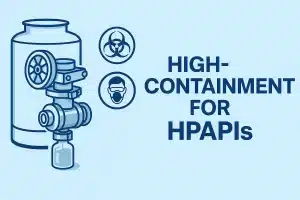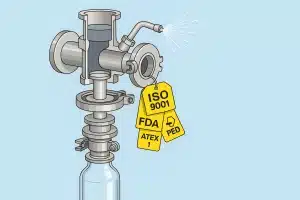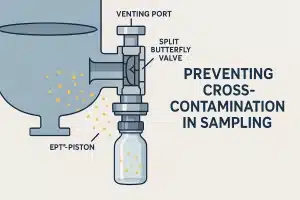Piston valves play a critical role in controlling the flow of fluids in various industrial applications. The purpose of this document is to explore the different types of piston valves, their working principles, and their specific applications. Understanding the types of piston valves is essential for selecting the appropriate valve for different industrial needs, ensuring efficient and reliable fluid control.
Types of Piston Valves
YVN – Flanged Piston Valves
Features
– Material Options: Cast Iron, Ductile Iron, Cast Steel, Stainless Steel.
– Size Range: DN 15-50.
– Pressure Classes: PN16, PN25, PN40.
– Temperature Range: -10°C to +400°C.
– Flanged: According to DIN EN 1092-2 for PN16 and PN25; DIN EN 1092-1 for PN40.
– Applications: Suitable for all kinds of fluids such as water, steam, thermal oil, LPG, fuel oil, and pressurized air.
Benefits
– Asbestos-Free: Ensuring safety and compliance with health regulations.
– Energy Efficient : Minimizing energy loss.
– Maintenance-Free: Designed for long-term use without frequent maintenance.
– Exceptional Leak Tightness: Ensuring no fluid escapes, providing environmental and operational safety.
– Fire Safety: Tested according to ISO 10497 / API 607.
– Certified: Conforms to German TA Luft and USA EPA standards.
YVMN – Screwed Piston Valves
Features
– Material Options: Cast Iron, Cast Steel, Stainless Steel.
– Size Range: 1/4” to 2”.
– Pressure Classes: PN16, PN40, PN63.
– Connections : Screwed (NPT) type available according to ANSI 2.1 1960 on demand.
– Applications : Versatile use for various fluid types.
Benefits
– Economic and Easy to Service: Simplifies maintenance processes.
– Replaceable Valve Rings : Reduces downtime and extends valve life.
– Excellent Control Characteristics : Ensures precise fluid control.
– Fire Safety and Leak Tightness : Meets stringent safety standards.
YVSN – Socket Weld Piston Valves
Features
– Material Options: Cast Iron, Cast Steel, Stainless Steel.
– Size Range: 1/4” to 2”.
– Pressure Classes: PN16, PN40, PN63.
– Connections: Socket weld type, ensuring secure and leak-proof connections.
– Applications: Ideal for high-pressure and high-temperature applications.
Benefits
– Durable and Reliable: Designed for tough industrial environments.
– Easy Ring Replacement : Facilitates quick maintenance.
– Exceptional Leak Tightness: Prevents environmental contamination and energy loss.
– Compliance : Meets international safety and quality standards.
Working Principle of Piston Valves
Sealing System
The sealing system in piston valves is enabled by a stainless steel piston and a couple of special elastic rings that surround the piston tightly. The sealing surface is the side surface of the piston, where the upper ring provides sealing to the atmosphere, and the lower ring ensures tightness in the line.
Advantages of the Sealing System
– Outstanding Leak Tightness: Achieved by the compression of elastic rings, ensuring both atmospheric and line tightness.
– Abrasion Resistance: Since there is no direct contact between the cylindrical piston surface and the fluid, abrasion does not occur, enhancing valve longevity.
– Self-Cleaning: When the valve is being shut, the piston sweeps out any particles, preventing damage to the sealing system.
– No Corrosion: The sealing surfaces are not exposed to the fluid, eliminating corrosion risks.
– Energy Efficiency: Preventing leakage of steam and other power transfer fluids, contributing to energy savings.
Applications of Piston Valves
Piston valves are versatile and can be used in various applications, including:
– Steam and Vapor Systems: Ensuring reliable control in high-temperature environments.
– Water and Thermal Oil Systems: Suitable for both low and high-temperature fluids.
– Chemical Industry: Handling corrosive fluids with high efficiency.
– Food Industry: Ensuring hygienic and safe operations.
– Oxygen Lines: Certified for safe use in oxygen service.
Advantages of Piston Valves
High Reliability
Piston valves are renowned for their reliability due to their robust design and superior sealing system. The stainless steel piston and special elastic rings ensure long-lasting performance, even under demanding conditions. This reliability translates to reduced downtime and maintenance costs, making piston valves a cost-effective solution for many industries.
Low Maintenance
One of the significant advantages of piston valves is their low maintenance requirements. The design minimizes wear and tear, and the ease of replacing valve rings without removing the valve from the pipeline further simplifies maintenance. This feature is particularly beneficial in industries where minimizing downtime is crucial.
Energy Efficiency
Piston valves are designed to prevent leakage, which is critical in conserving energy, especially in systems involving steam or other power transfer fluids. By ensuring a tight seal, these valves help in maintaining system efficiency and reducing energy costs. This energy efficiency is a key factor in industries focused on sustainability and cost reduction.
Environmental Safety
The exceptional leak-tightness of piston valves ensures that no harmful fluids escape into the environment, aligning with stringent environmental regulations. This feature is particularly important in industries such as chemical processing and oil refining, where fluid containment is critical for environmental safety and compliance.
Versatility
Piston valves are versatile and can be used in a wide range of applications. Their ability to handle different types of fluids, including water, steam, thermal oil, and corrosive chemicals, makes them suitable for diverse industrial sectors. This versatility ensures that a single type of valve can meet various operational needs, simplifying inventory and maintenance processes.
Installation and Orientation
Proper Installation
For optimal performance, it is essential to install piston valves correctly. Proper alignment and secure connections are necessary to prevent leaks and ensure reliable operation. Installation guidelines should be followed meticulously to achieve the best results.
Orientation
Piston valves can be installed in different orientations depending on the application requirements. Vertical and horizontal installations are possible, but it is crucial to ensure that the valve’s stem is properly supported to prevent operational issues. Correct orientation enhances the valve’s performance and longevity.
Selecting the Right Piston Valve
Application Requirements
Selecting the right piston valve involves understanding the specific requirements of the application. Factors such as fluid type, pressure, temperature, and environmental conditions must be considered. By matching these factors with the appropriate valve type, optimal performance and durability can be achieved.
Material Selection
The material of the valve body and internal components plays a crucial role in its performance and longevity. Depending on the fluid and operating conditions, materials like cast iron, ductile iron, cast steel, and stainless steel may be chosen. Each material offers distinct advantages in terms of corrosion resistance, strength, and suitability for different temperatures and pressures.
Pressure and Temperature Ratings
Piston valves are available in various pressure and temperature ratings. It is important to select a valve that can withstand the operating conditions of the system to ensure safety and reliability. Understanding the pressure and temperature limits of each valve type helps in making an informed decision.
Advanced Features of Piston Valves
Fire Safety Compliance
Piston valves, such as the YVN flanged piston valves, are designed to meet stringent fire safety standards. They are tested according to ISO 10497 and API 607, ensuring that they can perform reliably in fire conditions. This compliance is essential in industries where fire hazards are a concern, providing an additional layer of safety.
Certified Sealing
The sealing performance of piston valves is certified according to German TA Luft and USA EPA standards. This certification guarantees that the valves provide exceptional leak tightness, which is critical for both environmental protection and operational efficiency. Certified sealing ensures that the valves meet the highest standards of performance and reliability.
Energy Efficient Design
The design of piston valves focuses on minimizing energy loss. By preventing leaks and maintaining a tight seal, these valves contribute to overall energy efficiency. This design consideration is particularly important in applications involving steam and thermal fluids, where energy conservation is a priority.
Conclusion
Understanding the types of piston valves is essential for selecting the right valve for various industrial applications. Piston valves, with their robust design, exceptional sealing system, and versatility, offer numerous advantages in terms of reliability, maintenance, energy efficiency, and environmental safety.
The YVN flanged, YVMN screwed, and YVSN socket weld piston valves each cater to specific needs, ensuring that there is a suitable valve for every application. By considering factors such as material selection, pressure and temperature ratings, and compliance with safety standards, industries can make informed decisions to enhance their operational efficiency and safety.
With their advanced features and proven performance, piston valves continue to be a preferred choice for fluid control in diverse industrial sectors. By leveraging the unique benefits of each valve type, industries can achieve optimal performance, reduce costs, and maintain stringent safety and environmental standards.





